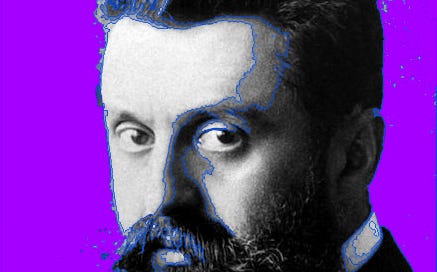The Question of Zionism II
The Holocaust seems eerily in keeping with Theodor Herzl’s apocalyptic vision: “Whoever can, will, and must perish, let him perish. But the distinctive nationality of the Jews neither can, will, nor must be destroyed…Whole branches of Judaism may whither and fall, but the trunk remains…”[1]
Herzl noted in his journal: “Anti-Semitism has grown and continues to grow — and so do I. I can still recall two different conceptions of the Question and its solution, which I had in the course of those years. About two years ago I wanted to solve the Jewish Question, at least in Austria, with the help of the Catholic Church. I wished to gain access to the Pope (not without first assuring myself of the support of the Austrian church dignitaries) and say to him: Help us against the anti-Semites and I will start a great movement for the free and honorable conversion of Jews to Christianity. Free and honorable by virtue of the fact that the leaders of this movement — myself in particular — would remain Jews and as such would propagate conversion to the faith of the majority. The conversion was to take place in broad daylight, Sundays at noon, in Saint Stephen’s Cathedral, with festive processions and amidst the pealing of bells. Not in shame, as individuals have converted up to now, but with proud gestures. And because the Jewish leaders would remain Jews, escorting the people only to the threshold of the church and themselves staying outside, the whole performance was to be elevated by a touch of great candor. We would still have adhered to the faith of our fathers. But we would have made Christians of our young sons before they reached the age of independent decision, after which conversion looks like an act of cowardice or careerism.”[2]
Later he wrote: “It would be an excellent idea to call in respectable, accredited anti-Semites as liquidators of property. To the people they would vouch for the fact that we do not wish to bring about the impoverishment of the countries that we leave. At first, they must not be given large fees for this; otherwise we shall spoil our instruments and make them despicable as ‘stooges of the Jews.’ Later their fees will increase, and in the end, we shall have only Gentile officials in the countries from which we have emigrated. The anti-Semites will become our most dependable friends, the anti-Semitic countries our allies. We want to emigrate as respected people.”[3] (55)
This seems to be very much in keeping with what occurred: “In 1921, Jabotinsky signed an agreement with Symon Petliura, a Ukrainian anti-Semite whose soldiers had carried out pogroms with tens of thousands of Jewish victims.”[4]
Not only did the Zionists act on these ideas before the war they also acted on them after the foundation of Israel. Thus, Zionists helped foster anti-Semitism in the Middle East as a means of forcing the Sephardi or Mizrahim Jews to come to the “promised land”.[5]
Ella Habiba Shohat points out that: “Zionism claims to be a liberation movement for all Jews, and Zionist ideologists have spared no effort in their attempt to make the two terms ‘Jewish’ and ‘Zionist’ virtually synonymous. In fact, however, Zionism has been primarily a liberation movement for European Jews (and that, as we know, problematically) and more precisely for that tiny minority of European Jews actually settled in Israel. Although Zionism claims to provide a homeland for all Jews, that homeland was not offered to all with the same largess. Sephardi Jews were first brought to Israel for specific European-Zionist reasons, and once there they were systematically discriminated against by a Zionism which deployed its energies and material resources differentially, to the consistent advantage of European Jews and to the consistent detriment of Oriental Jews.”[6]
As she and Naeim Giladi make clear Ben Gurion, following Herzl’s concept adumbrated above, implemented the same strategy he’d implemented in Nazi Germany, and with equal success. Of course, some of the Mizrahi emigrated to Israel willingly but many didn’t.
Judaism is not a nation, as Shlomo Sand states unequivocally; nor can it ever be one. It is a religion.[7]
The IDF has always played a key role in forming Zionist consciousness and literally molds Israel. It also helps facilitate the discrimination against the Mizrahi by putting a lid on social tensions. This has been especially important recently, as Israel has gone from being one of the countries with the highest degree of income equality to one of the ones with the greatest degree of income inequality in the world.[8]
War created Israel and war holds it together. Without it Israel would most probably fall apart.
As everyone who has followed politics in the Middle East knows, Israel facilitated the rise of Hamas, and it did so quite openly. Indeed, Netanyahu is quite open in his funding of it.[9]
What Hamas does, by virtue of its tactics and statements, is to provide a justification for huge military expenditure and legitimises the state of interminable war. Hamas is the bogeyman used to frighten the children of Israel and that particular fear has long been the principle means of governing the country. When it wasn’t Hamas it was the PLO and the PLFP or some other terrorist organisation. Without terror Israel could never have been created and without terror it couldn’t exist.
[1] p.74 The Transfer Agreement, Edwin Black
[2] p.7 The Complete Diaries of Theodor Herzl Translated by Harry Zohn 1960
[3] pp.83-84 Ibid
[4] Lehi.org. Foreign Relations during World War II
[5] Ben-Gurion’s Scandals, Naeim Giladi
[6] The Mizrahim in Israel, Zionism from the perspective of its Jewish victims, Ella Habiba Shohat
[7] The Invention of the Jewish People, Shlomo Sand
[8] The Origins of Income Inequality in Israel, Ofer Cornfeld and Oren Danieli, Israel Economic Review Vol 12, No.2 (2015), 51-95
[9] https://edition.cnn.com/2023/12/11/middleeast/qatar-hamas-funds-israel-backing-intl/index.html




